Key takeaways:
- Joining a literary critique group fosters community support, diverse perspectives, and accountability, enhancing personal and creative growth.
- Giving and receiving constructive feedback is essential; approach critiques with kindness, clarity, and encourage dialogue to foster a safe environment.
- Embracing criticism and reflecting on emotional responses leads to personal growth, helping writers transform vulnerabilities into authentic storytelling.
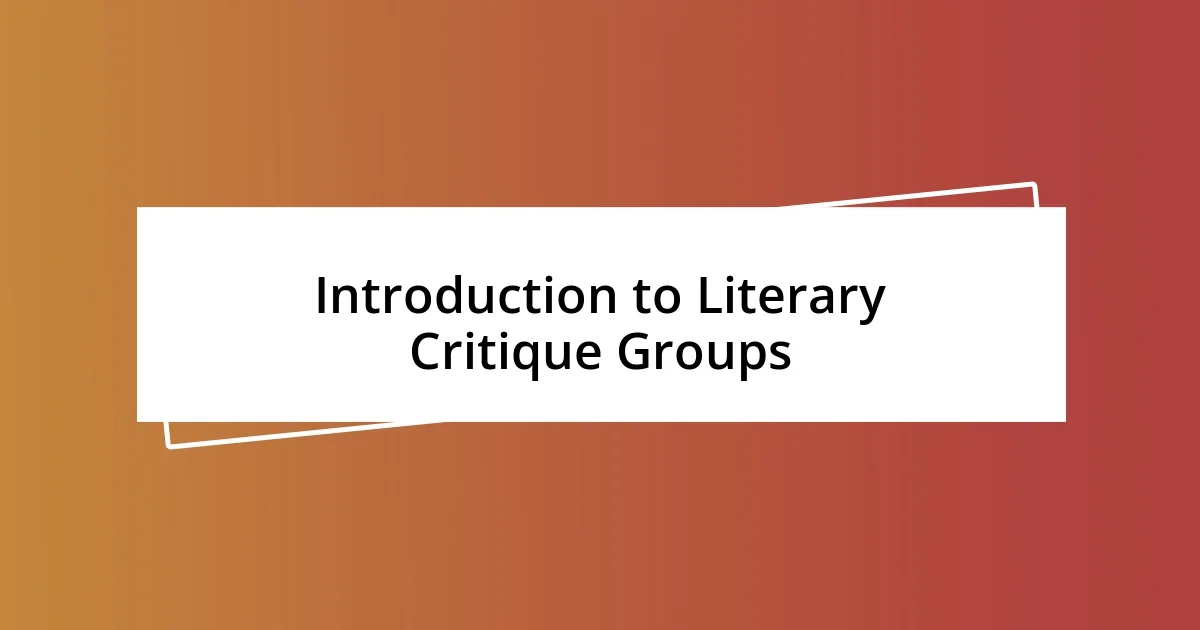
Introduction to Literary Critique Groups
Literary critique groups serve as valuable spaces for writers to share their work and receive constructive feedback. I remember the first time I joined one; my heart raced as my pages were dissected, yet I felt an electric thrill knowing I was part of a community that understood the journey of crafting stories. Who wouldn’t benefit from an extra set of eyes on their writing?
These groups can come in many forms, from casual meet-ups at local cafes to online forums buzzing with diverse perspectives. I often found comfort in knowing that others were grappling with similar challenges, like how to develop a character authentically or tighten narrative pacing. Don’t you think discussing these struggles in a supportive environment can elevate our writing experience?
In my experience, the peer feedback process is not just about honing one’s manuscript but also about fostering trust and camaraderie among writers. The laughter over shared heartbreaks in writing felt like a balm for my isolated creative soul. Have you ever shared a piece of your work, only to find it resonated deeply with someone else? It’s these moments that truly highlight the magic of critique groups.
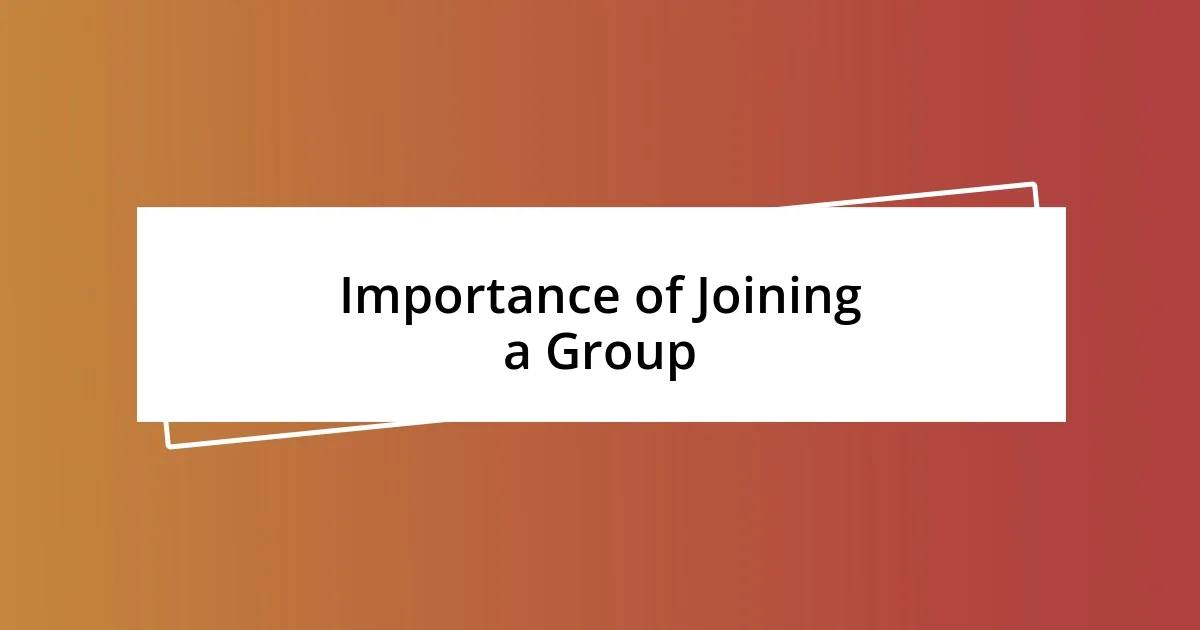
Importance of Joining a Group
Joining a literary critique group can significantly enhance your writing journey. It’s not just about receiving feedback; it’s about being part of an evolving community. I still remember when I shared a poem in my first critique session. The vulnerability of exposing my raw emotions felt intimidating, but the encouragement and suggestions I received inspired me to refine my voice. That sense of belonging made it easier to embrace the constructive criticism that ultimately improved my craft.
Another layer to this experience is the opportunity to learn from fellow writers. Each member brings unique insights and styles that can challenge your own perspectives. One time, a fellow member pointed out a repetitive theme in my work, something I had overlooked. It was enlightening! Engaging with diverse opinions not only honed my skills but also pushed the boundaries of my creativity. Wouldn’t you agree that fresh viewpoints can often illuminate paths we haven’t thought to explore?
Finally, being part of a group creates accountability. I remember committing to submit new excerpts for our bi-weekly meetings, which motivated me to write regularly. The pressure of showing up with new material helped instill a disciplined writing habit that I desperately needed. It’s amazing how collaboration can drive individual progress. Don’t you find that having peers who are equally dedicated can keep you motivated in both the highs and lows of writing?
| Benefits | Personal Experience |
|---|---|
| Community Support | Sharing my first piece brought a sense of belonging that encouraged growth. |
| Diverse Perspectives | Learning from different styles opened my eyes to new creative directions. |
| Accountability | Regular submissions pushed me to maintain a consistent writing schedule. |
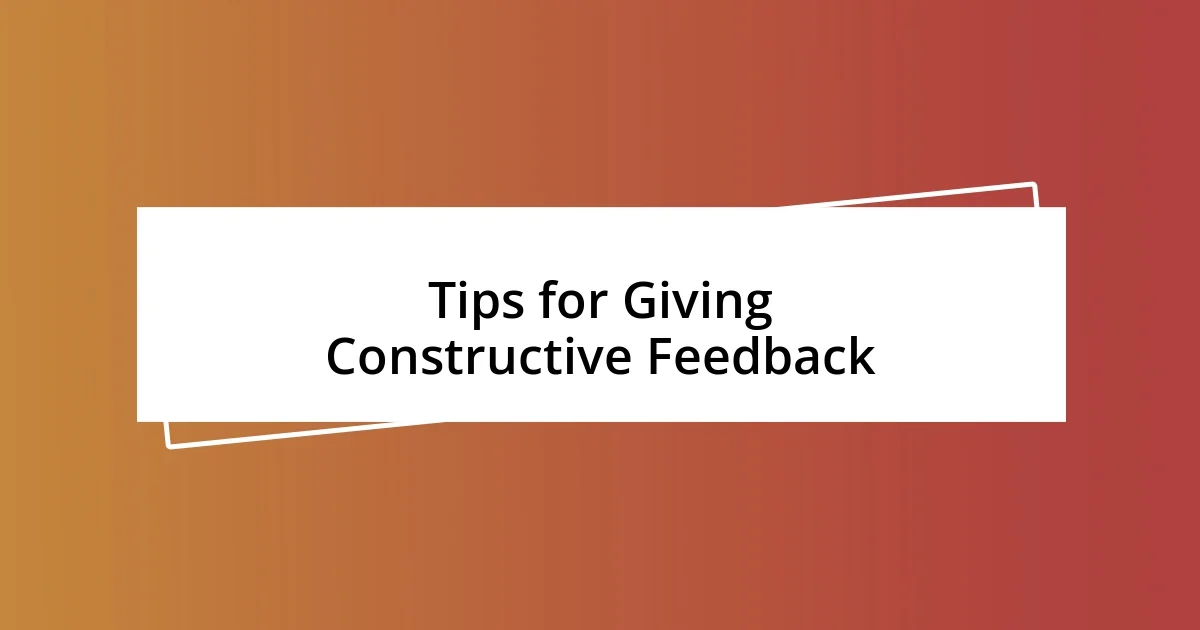
Tips for Giving Constructive Feedback
When giving constructive feedback, it’s crucial to frame your observations with kindness and clarity. I’ve found that starting with what works well in a piece sets a positive tone. For instance, I often begin my critiques by highlighting a strong character or a particularly vivid description before diving into areas that need improvement. This approach not only softens the blow but also builds the creator’s confidence.
Here’s a quick list of tips to keep in mind when offering feedback:
- Be specific: Instead of vague comments like, “This part was confusing,” try saying, “The transition from the main character’s thoughts to the action felt abrupt; perhaps adding a sentence could help.”
- Use ‘I’ statements: This personalizes your feedback, making it less accusatory. For example, “I felt a disconnect with the character here,” rather than “Your character doesn’t connect with the reader.”
- Encourage questions: Invite the writer to engage with your feedback. Phrasing it as, “How did you feel about this section?” can open a dialogue that helps deepen understanding.
Each time I provide feedback, I remind myself that my goal is to uplift and guide rather than to simply critique. This mindset has helped me foster an atmosphere where other writers feel safe to explore and grow.
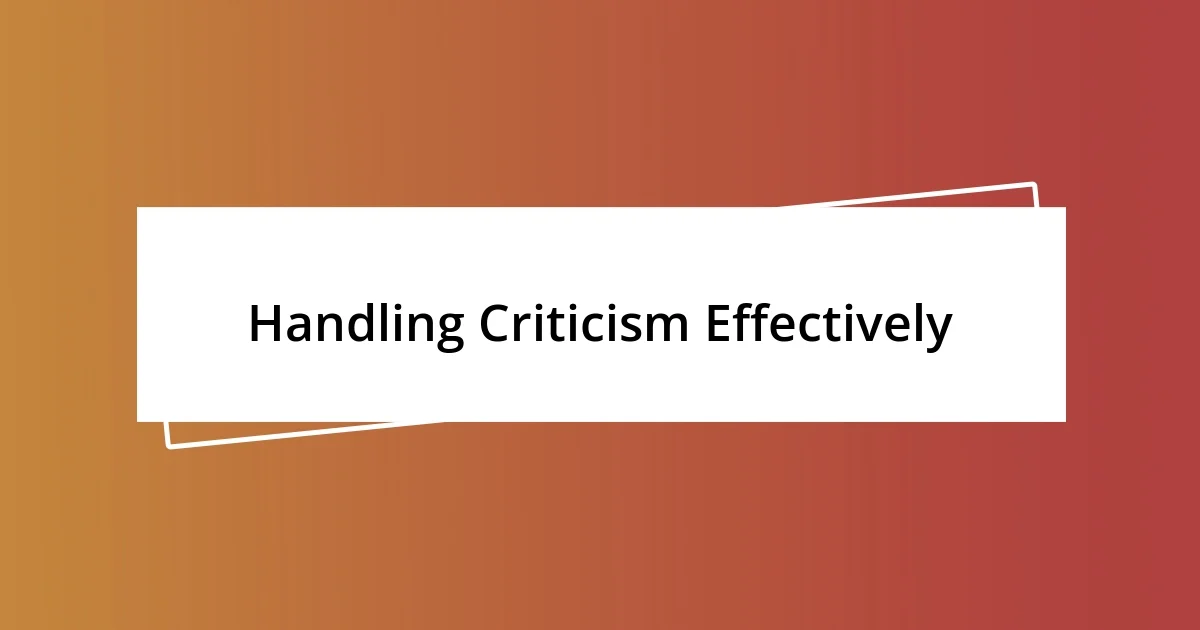
Handling Criticism Effectively
Handling criticism can be a real turning point in a writer’s journey. I remember facing tough feedback about a story I held dear; it felt like a punch to the gut. But instead of shutting down, I took a step back and asked myself: What can I learn from this? This shift in perspective helped me see criticism not as a personal attack but as a valuable opportunity for growth.
I’ve realized that how I approach criticism often affects how I receive it. After my first emotionally charged critique, I opened my heart to the feedback, but I made sure to breathe and process it slowly. Asking clarifying questions during the session transformed my experience. I found that engaging with my critics turned uncomfortable moments into enlightening conversations that fueled my writing passion.
It’s also important to acknowledge any emotional reactions to criticism. I’ve experienced that moment when my heart races upon hearing a harsh judgment. It’s natural, but I remind myself to pause and reflect. When I wrote a piece about loss, some critiques felt like they were probing into my vulnerabilities. However, by accepting these feelings as natural, I could channel them into refining my narrative rather than letting them deter my creativity. Wouldn’t you agree that embracing emotions can lead to deeper insights?

Leveraging Group Dynamics for Improvement
Leveraging group dynamics can significantly enhance the improvement process in literary critique groups. I remember a particular session when our group was discussing a member’s complex plot twist. Instead of just one person’s perspective shaping the feedback, we engaged in a lively debate, bouncing ideas off each other. It was fascinating to see how different viewpoints dissected the twist, ultimately leading to a stronger plot that resonated more deeply with readers.
The energy of collaboration becomes even more valuable when diverse writing styles and experiences come into play. In one critique circle, a romance novelist and a fantasy writer brought entirely different lenses to the same piece. Their contrasting insights opened my eyes to nuances I hadn’t considered before. Isn’t it remarkable how everyone’s unique voice can illuminate aspects of a work that might otherwise go unnoticed?
Moreover, I’ve found that celebrating small wins as a group fosters a sense of community and shared investment in each other’s growth. After providing feedback, we often took a moment to acknowledge the progress each writer made, no matter how small. This practice not only boosts morale but also strengthens our commitment to improve together. Who doesn’t appreciate a little cheerleading along the way?
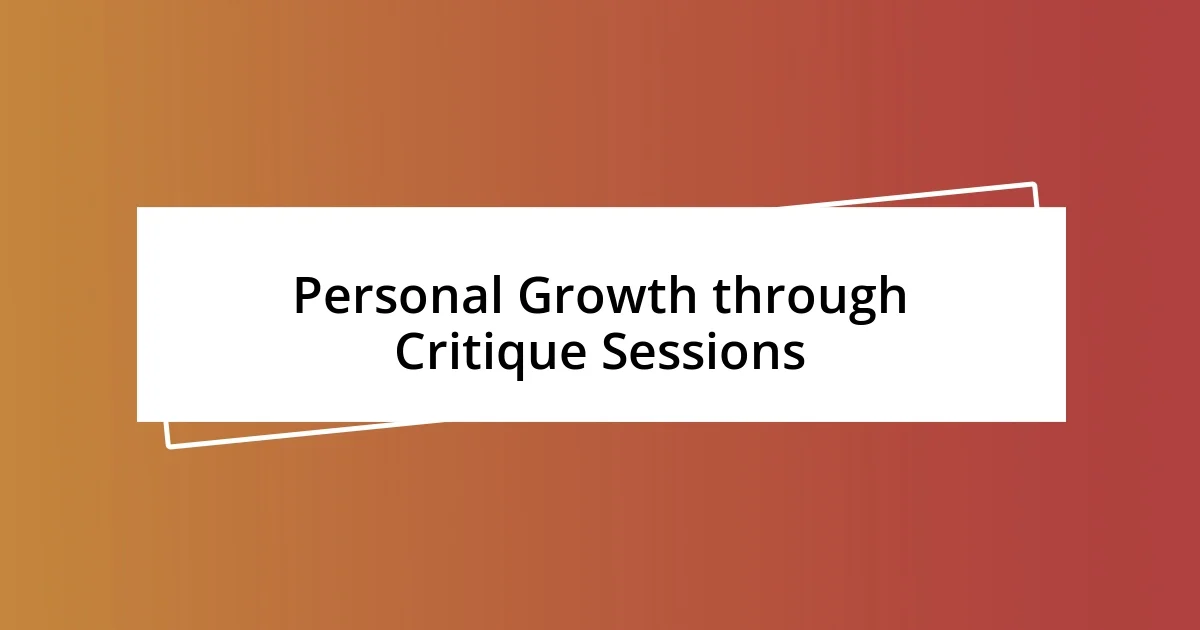
Personal Growth through Critique Sessions
Participating in critique sessions has been transformative for my personal growth as a writer. I remember an experience where a member pointed out the pacing issues in my short story. At first, it stung, but it quickly became an opportunity to delve deeper into my narrative structure. I realized that adjusting pacing isn’t just about speed; it’s about controlling the emotional journey for readers. Have you ever thought about how pacing affects your story’s impact? It was eye-opening for me.
Over time, these sessions have helped me cultivate resilience. After every critique, I began to journal my emotions and insights. Reflecting on my reactions revealed patterns in my writing that I was previously blind to. For instance, I found that I often shied away from vulnerability in my characters. By embracing those critiques, I could transform my emotional struggles into more authentic storytelling. Isn’t it fascinating how self-discovery often follows in the wake of honest feedback?
What I cherish most about these group experiences is the communal spirit they foster. I distinctly remember the relief and joy that washed over me when we collectively celebrated a member’s breakthrough. It reminded me that we’re not just critiquing; we’re building each other up. This bond created a safe space, empowering us to take risks in our writing. Isn’t it wonderful how a group can nurture our creative spirits together?














